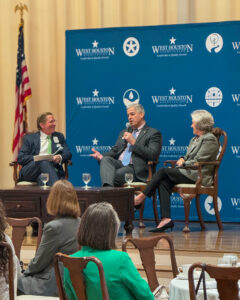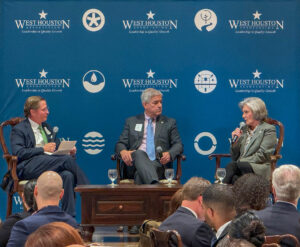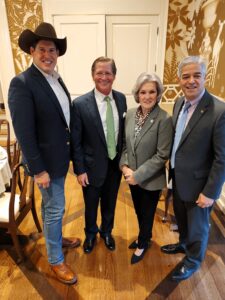 On October 21st, the West Houston Association (WHA) hosted Citywide Vision: Conversations with New Houston At-Large Council Members, featuring Council Members Julian Ramirez and Twila Carter. Moderated by WHA Board Member Harry Masterson of EMBER Real Estate Investment & Development, the event brought together regional stakeholders for an engaging dialogue about Houston’s priorities, challenges, and opportunities for growth.
On October 21st, the West Houston Association (WHA) hosted Citywide Vision: Conversations with New Houston At-Large Council Members, featuring Council Members Julian Ramirez and Twila Carter. Moderated by WHA Board Member Harry Masterson of EMBER Real Estate Investment & Development, the event brought together regional stakeholders for an engaging dialogue about Houston’s priorities, challenges, and opportunities for growth.
Masterson opened the discussion by inviting the council members to introduce themselves and share their top priorities. Council Member Ramirez, who has a background in law, highlighted public safety and affordable housing as key issues, alongside improving infrastructure. “The At-Large role allows us to focus on larger issues that affect the entire city of Houston,” he explained. Council Member Carter emphasized a similar commitment to public safety and infrastructure, noting, “Infrastructure is a key issue as it affects everything we do. It underpins our economy, mobility, and quality of life.”
The conversation naturally shifted to the importance of collaboration, both among governmental entities and with the private sector. Masterson reflected, “Over the past year, I’ve seen enhanced relationships between the City and the County, as well as between the City and the State. How can we continue to build on these relationships and increase cooperation?” Ramirez pointed to successful partnerships with Harris County Commissioner Lesley Briones, noting, “The City is within the County, and we need to realize that.” He also spoke of collaboration with the Texas legislature for more funding for our water system and quipped, “I hope we are all rowing in the same direction.” Carter emphasized the importance of working with private sector experts, stating, “As I look across this room, I see so many experts in their fields. Collaboration with the private sector is critical to ensuring we do things more efficiently and effectively.” Masterson described Houston’s current landscape as a renaissance period of collaboration, but that as we address housing shortages, public safety, and infrastructure, “these challenges are too big for the public or private sector to tackle alone.”
 Transportation and mobility emerged as significant topics, with discussions ranging from bike lanes to rail to highway corridors, with an emphasis on regional connectivity. Carter suggested rethinking existing systems: “If I had been in charge back then, our HOV lanes would have been light rail. It’s really about moving large amounts of people in an expedited manner.” Reflecting on the conversation about high-speed rail between DFW and Houston, she suggested instead a focus on rail into Fort Bend and Waller counties, such as Sugar Land to Houston. Ramirez expressed caution, emphasizing practicality and ridership. “The last thing we need is to spend a ton of money on something people aren’t going to use,” he said, pointing out that most Houstonians prefer cars for their convenience. He agreed with Masterson’s suggestion to secure corridors for future rail development, noting, “That’s a wise thing to do. Planning ahead ensures we have options for the future.”
Transportation and mobility emerged as significant topics, with discussions ranging from bike lanes to rail to highway corridors, with an emphasis on regional connectivity. Carter suggested rethinking existing systems: “If I had been in charge back then, our HOV lanes would have been light rail. It’s really about moving large amounts of people in an expedited manner.” Reflecting on the conversation about high-speed rail between DFW and Houston, she suggested instead a focus on rail into Fort Bend and Waller counties, such as Sugar Land to Houston. Ramirez expressed caution, emphasizing practicality and ridership. “The last thing we need is to spend a ton of money on something people aren’t going to use,” he said, pointing out that most Houstonians prefer cars for their convenience. He agreed with Masterson’s suggestion to secure corridors for future rail development, noting, “That’s a wise thing to do. Planning ahead ensures we have options for the future.”
The conversation then turned to utility infrastructure planning, both in regards to energy and water. Energy reliability and resilience were key points of discussion, with both council members supporting innovative solutions. Ramirez advocated for incentivizing micro-grids and smaller-scale nuclear power to address the increasing demand for energy. “Our grid won’t be able to supply everything we need in the future,” he said. Smaller, localized solutions could bridge the gap. Carter, highlighted the potential of solar and battery farms, “We’ve talked about these ideas in the past, but we need to act on them,” stressing that the city needs to be proactive in creating opportunities for these technologies. Water was another focus point given it’s critical role as the region’s population continues to grow. Ramirez expressed pride in Houston’s water system, which serves over five million people across four counties. He stressed the importance of regional collaboration on projects like the Allen’s Creek Reservoir, saying, “Maintaining and expanding our water systems

will be vital for supporting the region’s growth.” Carter, a resident of Kingwood, shared her unique perspective on water challenges, noting her “love-hate relationship” with the resource. She highlighted how reservoirs could serve both flood control and water supply needs.
With Houston set to host the World Cup, Alia Vinson asked how the city can prepare for the global stage. Ramirez highlighted the opportunity to reshape perceptions of Houston. “We need to address misconceptions about flooding and crime. Houston is a place of opportunity—welcoming, diverse, and resilient. We must showcase what makes our city great,” he said. Carter emphasized practical steps, such as completing airport improvements on time and addressing homelessness. “In order to showcase Houston, we need to be safe, clean, and ready to welcome the world,” while referencing the need to stop talking about how hot it is and instead focus on showing why it’s a great place to live and visit.
Masterson concluded the discussion by asking the council members how the private sector could best support the city. Ramirez encouraged continued advocacy and outreach, and mentioned that there is a need for support on the issue of homelessness which has been exacerbated by the loss of federal funding. Carter called for collaboration across all areas, emphasizing the need for a regional focus and innovative ideas to tackle challenges like affordable housing and undeveloped land.
This event underscored the vital role of partnerships in addressing Houston’s challenges and advancing its future. As WHA continues to foster dialogue among public and private leaders, the insights shared by Council Members Ramirez and Carter will help shape the city’s vision for a stronger, more resilient Houston.
